An invoice is a document businesses use to request payment. It lists the goods or services a customer has received. An invoice is important because it keeps records of sales and tracks payments. Businesses and freelancers often use invoices to ensure they get paid properly.
Understanding different types of invoices is crucial. Each type has a specific use. For example, some are for selling products, while others are for services. Knowing which invoice to use can help avoid confusion. This makes transactions smoother for both the business and the customer. This knowledge is key whether dealing with business or personal transactions.
In this article
Part 1. What is an Invoice?
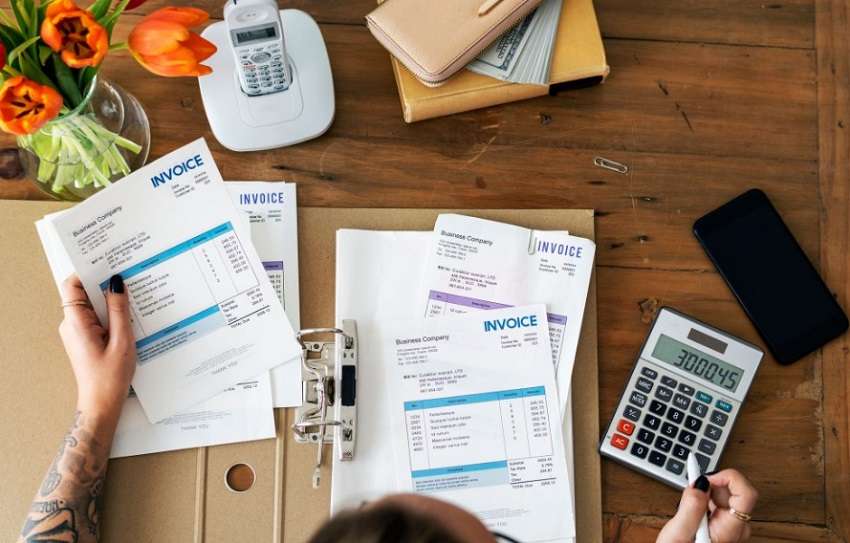
An invoice is a document a business sends to charge for products or services. It lists what a customer must pay. The purpose of an invoice is to ask for payment after a service or sale. It shows the price, quantity, and terms of payment. This helps both the business and customer track payments and deliveries.
Invoices differ from receipts and bills. A bill is given before payment to show how much is owed. Once you pay, you get a receipt. The receipt shows you paid. An invoice, on the other hand, can come before or after payment. It depends on the agreement.
The invoice's meaning is simple. It is a way for businesses to request payment. It contains details like costs and payment terms. This document is crucial for managing money in a business. It makes sure everyone agrees on the sale details.
Types of Invoices
There are several types of invoices that businesses use depending on the situation. Here is an easy guide to understanding these different types:
- Standard Invoice: This is the most common type. It is used by businesses to bill clients after a service has been provided or goods have been delivered.
- Pro Forma Invoice: This is a preliminary bill of sale. It is sent before delivering goods or services. It shows the customer what to expect in terms of costs and details.
- Commercial Invoice: This type is used in international trade. It provides details about the goods being shipped. This includes their value for customs, taxes, and duties.
- Credit Invoice: Sometimes called a credit memo, it shows a refund or credit to the customer. For example, if goods are returned or overcharged.
- Debit Invoice: This indicates an increase in the amount due. It is used when the original invoice is less than it should have been.
- Timesheet Invoice: Used by freelancers and contractors who charge by the hour. It lists the hours worked and the rate per hour.
Understanding these invoices helps businesses and clients manage payments clearly and effectively.
Part 2. Importance of Invoices
Invoices are crucial for running a business smoothly. They play a big role in accounting and legal areas. Understanding the "invoice meaning in business" helps us see why they are important.
First, invoices help keep track of sales and income. This is essential for managing a business's finances. A business can keep its accounts clear and up-to-date by recording every transaction.
Second, invoices are important for tax purposes. They provide a record of earnings and expenses. This information is needed when filing tax returns. It shows the government how much the business has made and spent.
Lastly, invoices serve as legal proof of a transaction. They can help solve disputes over payments. If there is a disagreement, the invoice shows what was agreed upon. This can protect a business in legal situations.
When to Use Invoices
Understanding "when to use invoices" and "what's an invoice" can help in many business situations. Here are some specific scenarios where using an invoice is necessary or helpful:
- An invoice should be issued whenever a business sells a product or service. This officially requests payment from the customer.
- Freelancers and contractors often use invoices. They send them after finishing a job to get paid for their work.
- For long-term projects, businesses may send periodic invoices. These are often based on milestones or time. It helps manage cash flow during the project.
- Invoices are essential for customs in international shipping. They list the value of goods and are used to calculate duties and taxes.
In these situations, invoices help ensure that businesses get paid correctly and on time. They also keep financial records clear and precise for both parties involved.
Examples of Invoices
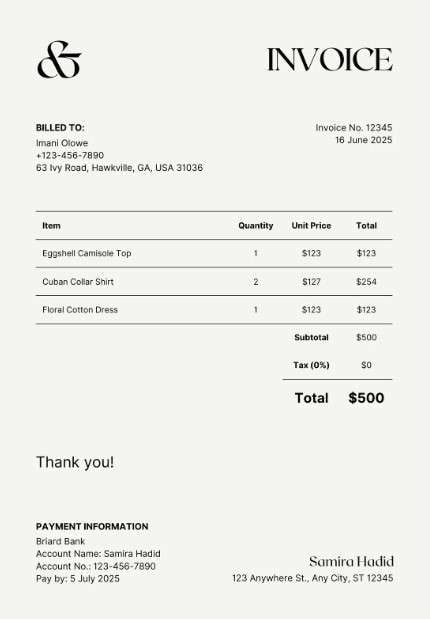
Examples make understanding "invoice billing" and "what does invoice mean" easier. Here are some common types of invoices and what they typically include:
- Service Invoice: Used by service businesses like consulting or landscaping. It lists services provided, hours worked, and rates.
- Product Invoice: Issued by stores or companies that sell goods. It shows products sold, quantities, and prices.
- Progress Invoice: Used for ongoing projects. It requests payment for part of the work completed during a specific period.
Each invoice typically has some key elements:
- Header: This shows the word "Invoice" and might include an invoice number.
- Contact Information: Details of the business and customer.
- Date: The date the invoice was issued.
- Item List: Services or products provided, with prices.
- Total Amount: How much the customer needs to pay.
These elements help make clear what the business is billing for, tying into the basic meaning of an invoice.
Benefits of Using Invoices
Using invoices offers several benefits that help in running a business efficiently:
- An invoice helps keep track of sales and services provided. It creates a financial record essential for managing accounts and preparing budgets.
- An invoice serves as a legal document. It proves that a service or product was offered and payment was requested. This is useful if there are disputes over payments.
- Sending an invoice shows professionalism. It tells customers that the business is systematic and serious about its financial dealings.
When thinking about "is an invoice a bill," they are similar but used at different times. A bill is presented to request immediate payment, often before a service. On the other hand, an invoice can be issued before or after the service or product delivery, depending on the agreed payment terms. This flexibility makes an invoice a versatile tool in business transactions.
Part 3. How Wondershare PDFelement Facilitates Invoice Writing
Wondershare PDFelement - PDF Editor Wondershare PDFelement Wondershare PDFelement is a powerful tool that makes invoice writing easier and more efficient. It offers many features that are especially useful for businesses. Here’s how it helps:
Templates: PDFelement has ready-to-use invoice templates. This saves time and ensures that invoices look professional.
Merge PDF: Combine multiple documents into one invoice. This is useful when adding terms or product details from different files.
Convert: Easily change invoices between formats. For example, convert from PDF to Word or Excel. This helps when you need to edit details.
Compress PDF: Reduce the size of invoice files. This makes them easier to email and quicker to download.
E-Sign: Add digital signatures directly to invoices. This speeds up the approval process.
AI Tools: Features like Chat with PDF, Summarize, Proofread, and Rewrite help improve the accuracy and clarity of invoices.
The newly launched online tools of PDFelement further enhance these capabilities. You can quickly convert, compress, and merge PDF files online. This means you can manage invoices directly from your browser, making the process even more convenient.
These features simplify the creation and management of invoices and help maintain high professionalism in business communications.
How to Write Invoices Using PDFelement
Creating an effective invoice with Wondershare PDFelement is straightforward. Here’s a simple step-by-step guide to help you make clear and professional invoices:
Step 1
Open the program on your computer. Click the "+" sign and choose "PDF Template" to access the Template Mall.
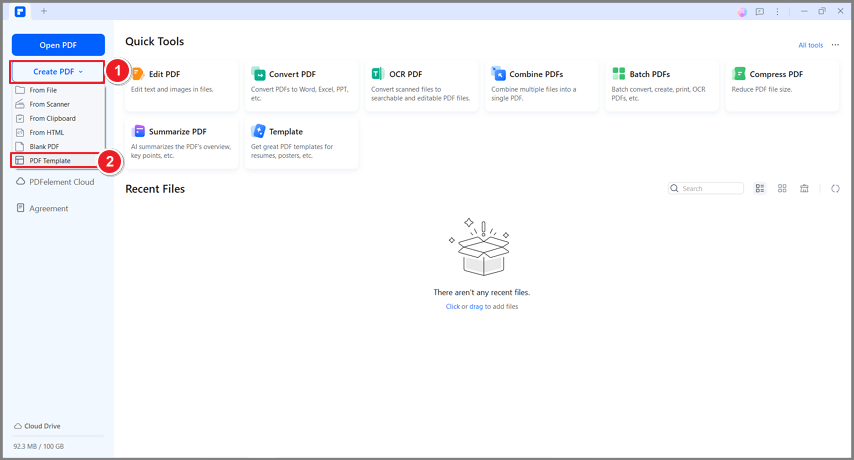
Image File Name: what-is-an-invoice-3.jpg Alt Text: open pdfelement
Step 2
Browse through the invoice templates. Select one that fits your business style.
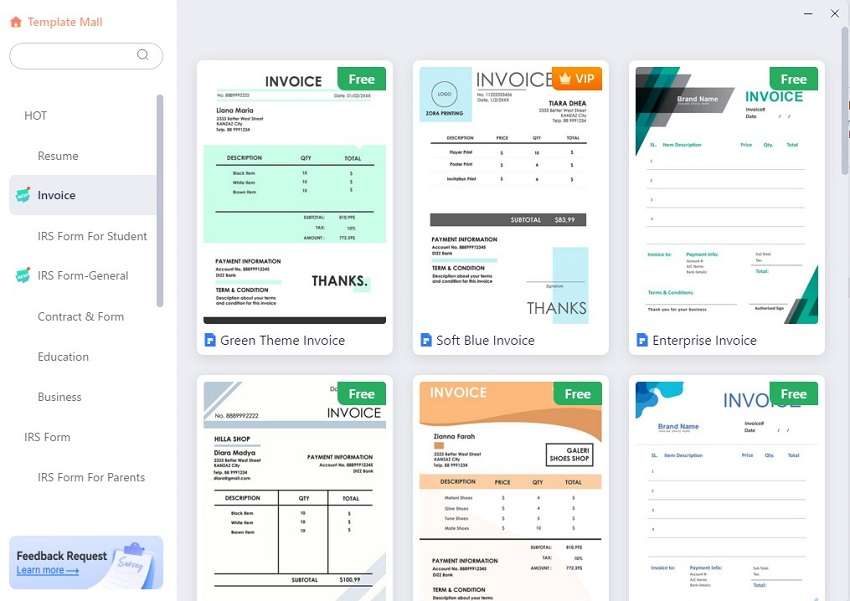
Image File Name: what-is-an-invoice-4.jpg Alt Text: pdfelement template mall
Step 3
Once you've chosen a template, you can edit it. Change things like colors and fonts to match your business branding. This makes your invoice look professional and unique.
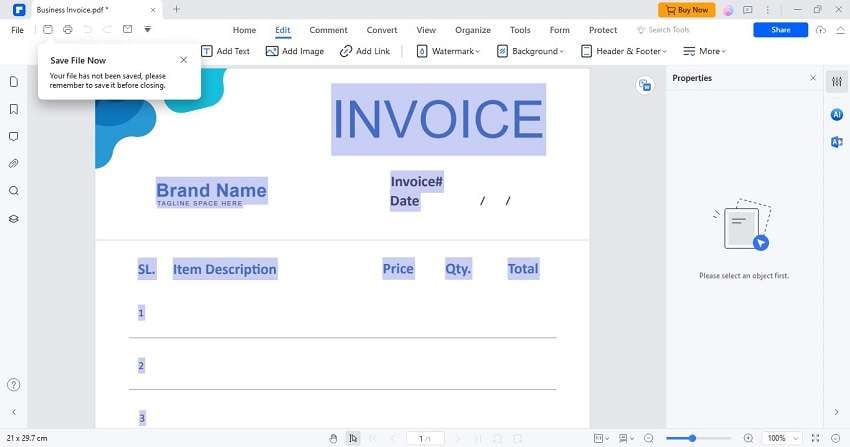
Image File Name: what-is-an-invoice-5.jpg Alt Text: edit invoice template
Step 4
If you have questions about your invoice, use the "Chat with PDF" feature. It uses AI to help answer questions or make suggestions.
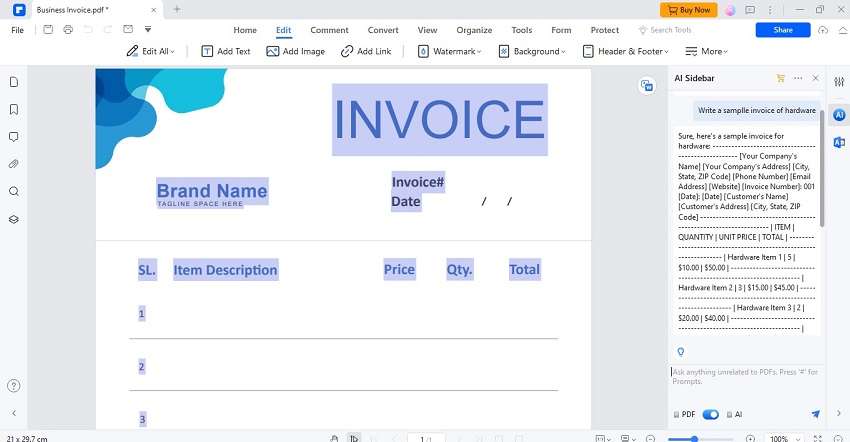
Image File Name: what-is-an-invoice-6.jpg Alt Text: pdfelement chat with pdf
Step 5
Add the necessary details to your invoice. Include items like:
- Your business name and contact information
- Customer’s name and contact details
- Date of the invoice
- List of services or products provided
- Prices and total amount due
- Payment terms and due date
- Any additional notes (like late payment fees or discounts)
- Make sure all the information is accurate and clearly stated.
Step 6. Once your invoice is complete, save it. You can save it as a PDF or in other formats if needed. You can also directly email it from PDFelement or print it out.
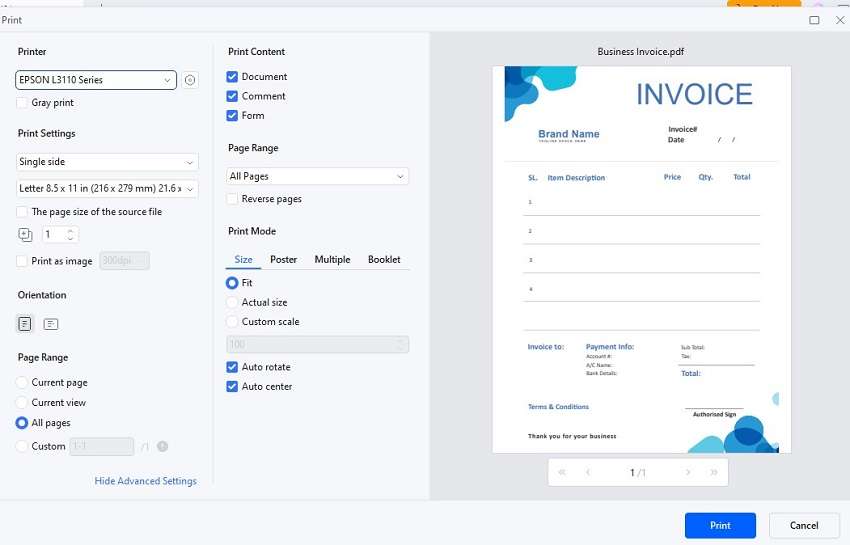
Using these steps in PDFelement simplifies the invoice creation process and ensures that your invoices are well-organized and professional. This helps maintain a good customer relationship and streamlines your billing process.
Conclusion
An invoice is essential for business transactions as it details services or products provided and requests payment. Various invoices are tailored to different business needs, from standard to commercial. Using invoices correctly ensures efficient record-keeping, legal protection, and professionalism. Wondershare PDFelement enhances the invoice process with customizable templates, conversion tools, and AI-enhanced services. This makes creating, managing, and sending invoices simple and effective. With PDFelement, businesses can maintain clear financial records and present a professional image to their clients.

 G2 Rating: 4.5/5 |
G2 Rating: 4.5/5 |  100% Secure
100% Secure



